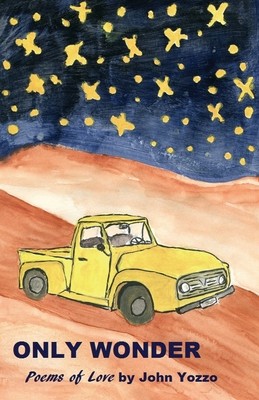
- We will send in 10–14 business days.
- Author: John Yozzo
- Publisher: Village Books Press
- Year: 2017
- ISBN-10: 193692319X
- ISBN-13: 9781936923199
- Format: 14 x 21.6 x 0.7 cm, minkšti viršeliai
- Language: English
- SAVE -10% with code: EXTRA
Reviews
Description
John Yozzo may be one who comes to mind when you hear
the phrase, "It's always the quiet ones . . . " A well-mannered, retired
professor of English, puttering away at his part-time farmhand job,
pedaling his bicycle, writing. Long time married man. Nice guy.
You get the picture. But, that whole scenario takes a refreshing turn when
you see the poems in this collection he calls, Only Wonder. With unexpected
passion, he explores love, deeply, in all its incarnations. Love for familiar
objects, love for one's mate, and most of all, love for the everyday minutiae
of living on this earth. With his exquisite lyrical expressions he calls us
back to the human capacity that we tend to forget or to put aside when
caught up in "problems." But, he goes even further. He also cautions against
assuming that love is the easy answer. He reminds us of the hard facts;
that "life was not meant/to be painless/nor the problems/of death solvable/
and that, "life, some Russian/said, was accepting/ the loss of one joy/
after another/so love . . . is no/ archetypical picnic/either." These poems will
make clear why, in the face of love, we can "only wonder!"
EXTRA 10 % discount with code: EXTRA
The promotion ends in 22d.14:45:07
The discount code is valid when purchasing from 10 €. Discounts do not stack.
- Author: John Yozzo
- Publisher: Village Books Press
- Year: 2017
- ISBN-10: 193692319X
- ISBN-13: 9781936923199
- Format: 14 x 21.6 x 0.7 cm, minkšti viršeliai
- Language: English English
John Yozzo may be one who comes to mind when you hear
the phrase, "It's always the quiet ones . . . " A well-mannered, retired
professor of English, puttering away at his part-time farmhand job,
pedaling his bicycle, writing. Long time married man. Nice guy.
You get the picture. But, that whole scenario takes a refreshing turn when
you see the poems in this collection he calls, Only Wonder. With unexpected
passion, he explores love, deeply, in all its incarnations. Love for familiar
objects, love for one's mate, and most of all, love for the everyday minutiae
of living on this earth. With his exquisite lyrical expressions he calls us
back to the human capacity that we tend to forget or to put aside when
caught up in "problems." But, he goes even further. He also cautions against
assuming that love is the easy answer. He reminds us of the hard facts;
that "life was not meant/to be painless/nor the problems/of death solvable/
and that, "life, some Russian/said, was accepting/ the loss of one joy/
after another/so love . . . is no/ archetypical picnic/either." These poems will
make clear why, in the face of love, we can "only wonder!"


Reviews